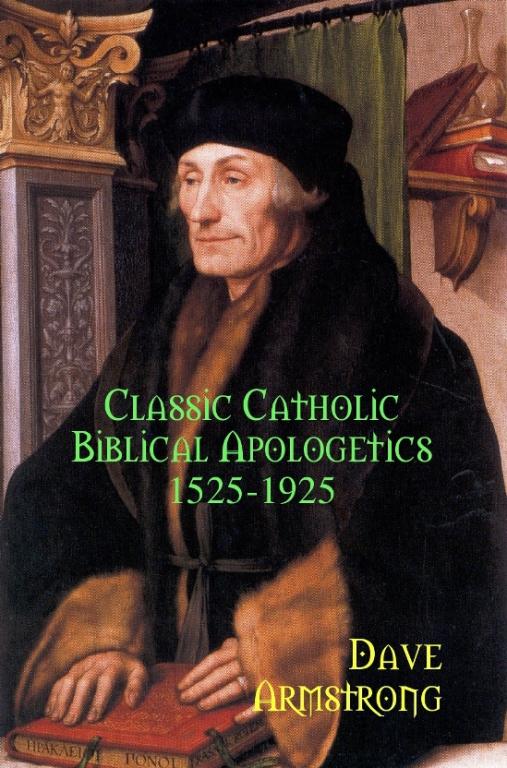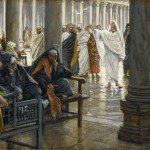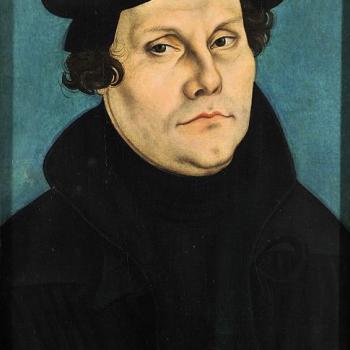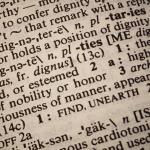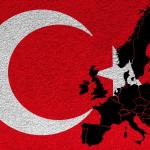[completed and published at Lulu on 6 February 2012: 246 pages]
***
[cover design by Dave and Judy Armstrong]
***
— to purchase, go to the bottom of page —
***
TABLE OF CONTENTS
Dedication (p. 3)
Introduction (p. 5) [read below]
Bibliography and Abbreviations (p. 9) [see below]
Brief Descriptions of Apologists (p. 15) [read below]
Classic Biblical Apologetics Listed by Scripture Passages (p. 27)
Index of Scripture Passages (p. 233)
Index of Topics (p. 241)
INTRODUCTION
***
The present volume came about as a result of reflection upon two great loves of mine: biblical apologetics in defense of the Catholic faith, and compilations of great historical Catholic quotations and arguments. My overwhelming methodological emphasis, as a full-time apologist these past ten years, is on the former, as is readily seen in the titles of many of my books, such as
A Biblical Defense of Catholicism (Sophia Institute Press, 2003),
The Catholic Verses (Sophia, 2004), and
Bible Proofs for Catholic Truths (Sophia, 2009). My website (now a blog) online since 1997, is entitled “Biblical Evidence for Catholicism.”
*
Also among my books are compilations of the quotations of Blessed John Henry Cardinal Newman and G. K. Chesterton: The Quotable Newman (Sophia, 2012) and The Wisdom of Mr. Chesterton (Saint Benedict Press, 2009).
As I pondered these two strains of what I like to do, writing-wise, I developed a desire to start compiling some historic Catholic apologetics that centered on biblical argumentation, as a counter to the Protestant emphasis (sola Scriptura), and came up with the idea of “post-Protestant Catholic biblical apologetics” that could be collected from online versions (a lot less typing!), since it is all public domain material.
In this way I could continue working in both areas that I really enjoy, all in one new project; and complement the quotations I have already collected. Cardinal Newman mostly concentrated on Anglicanism, insofar as he wrote (relatively little) about comparative exegesis, whereas Chesterton didn’t write biblical apologetics much at all, and was far more interested in opposing the ideas of secularism and agnosticism and dealing with Protestantism from a cultural and historical standpoint.
The person I initially had in mind when pondering this book, was St. Francis de Sales, whose Catholic Controversy is a wonderfully insightful exercise in biblical apologetics, specifically against Calvinists (multiple thousands of whom he won back to the Catholic faith through his tireless efforts). This great saint and apologist will be cited frequently in this book (probably more than any other).
All in all, I shall cite twelve classic Catholic authors, and categorize the arguments or biblical commentary in order of the biblical books. Multiple topics often appear under one Bible passage, and the Index of Topics at the end (69 total) is very handy to locate various subjects. 228 biblical passages are featured (including 50 from the Old Testament).
Only excerpts that utilize directly biblical argumentation will be used. And all or virtually all references to Catholic magisterial sources will be omitted, so that Protestant readers can observe Catholic arguments solely devoted to the text of the Bible: whether positively presenting a Catholic position, or opposing an erroneous Protestant doctrine allegedly supported by the same Bible.
I hope and pray that readers will enjoy discovering and learning from this wonderful treasure-trove of historic Catholic apologetics, as much as I enjoyed locating these precious gems and compiling them in some kind of accessible order.
I intend for this book to be a very practical aid in apologetic outreach, and a reference source. It is essentially a “Classic Catholic Apologetic Commentary”: but devoted to the post-Protestant period up through the early 20th century, rather than the patristic period, or the age of St. Thomas Aquinas and the Scholastics, as we often see in other similar works. Perhaps it can fill a certain “time period” void in the apologetic literature.
BIBLIOGRAPHY AND ABBREVIATIONS
***
[chronologically by death dates of the primary authors; sources will be indicated in the text by the abbreviated name of the author and number of book corresponding to those below, with page number also]
*
[Linked works (by title) are available to read online in their entirety, or in a few cases, to a great extent]
*
St. Thomas More (1478-1535) [More]
*
[3]
The Wisdom and Wit of Blessed Thomas More (edited by Thomas Edward Bridgett; London: Burns & Oates, 1892)
[4] Thomas More (Christopher Hollis; Milwaukee: Bruce Publishing Company, 1934)
[5] Erasmus, Tyndale, and More (William Edward Campbell; Milwaukee: Bruce Publishing Company, 1949)
[6] The Essential Thomas More (edited by James J. Greene and John P. Dolan; New York: Mentor-Omega Books, 1967)
*
Desiderius Erasmus (1466-1536) [Era.]
*
[1] Erasmus-Luther: Discourse on Free Will (edited and translated by Ernst F. Winter; New York: Frederick Ungar Publishing Co., Inc., 1961)
[2] Collected Works of Erasmus, Vol. 76: Controversies (Hyperaspistes; edited by Charles Trinkaus; translated by Peter Macardle and Clarence H. Miller; University of Toronto Press, 1999)
*
Francisco Suárez (1548-1617) [Suar.]
*
*
St. Francis de Sales (1567-1622) [FdS]
*
[1] The Catholic Controversy (translated by H. B. Canon MacKey; third revised edition, London: Burns & Oates, Ltd. / New York: Benziger Brothers, 1909)
*
Blaise Pascal (1623-1662) [Pas.]
*
[1] Miscellaneous Writings (translated by M. P. Faugère; London: Longman, Brown, Green, and Longmans, 1849)
[2] Thoughts [Pensées] (translated by W. F. Trotter, c. 1910; reprinted by New York: E. P. Dutton & Company, Inc., 1958)
*
Jacques-Bénigne Bossuet (1627-1704) [Bos.]
*
[2] A Conference on the Authority of the Church (with Calvinist Minister John Claude; Baltimore: John Murphy, 1842)
*
Nicholas Cardinal Wiseman (1802-1865) [Wise.]
*
*
William Bernard Ullathorne (1806-1889) [Ull.]
*
*
Robert Hugh Benson (1871-1914) [Ben.]
*
[1] The Religion of the Plain Man (London: Burns & Oates, 1906)
[2] The Friendship of Christ (London: Longmans, Green, and Co., 1912)
*
James Cardinal Gibbons (1834-1921) [Gib.]
*
[1] The Faith of Our Fathers (Baltimore: John Murphy Company, 93rd revised and enlarged edition, 1917)
*
Ferdinand Prat, S. J. (1857-1938) [Prat]
*
[1] The Theology of St Paul, Vol. 1 (translated from the 11th French edition by John L. Stoddard; Westminster, Maryland: The Newman Bookshop, 1952; originally 1923)
[2] The Theology of St Paul, Vol. 2 (translated from the 10th French edition by John L. Stoddard; Westminster, Maryland: The Newman Bookshop, 1952; originally 1923)
*
Karl Adam (1876-1966) [Adam]
*
[1] The Spirit of Catholicism (translated by Dom Justin McCann; Garden City, New York: Doubleday Image, 1954 [originally 1924] )
***
BRIEF DESCRIPTIONS OF APOLOGISTS
[mostly from Wikipedia and the 1910 Catholic Encyclopedia]
***
St. Thomas More (1478-1535)
***
English lawyer, social philosopher, author, statesman and noted Renaissance humanist; counselor to King Henry VIII of England and, for three years, Lord Chancellor. He wrote his famous political commentary Utopia in 1516, and tracts in opposition to the teachings of Martin Luther and William Tyndale. More refused to accept Henry VIII as Supreme Head of the Church of England: a status the king had been given by a compliant parliament through the Act of Supremacy of 1534. He was imprisoned in 1534 for his refusal to take the oath required by the First Succession Act, because the act disparaged the power of the Pope and Henry’s marriage to Catherine of Aragon. In 1535, he was tried for treason, convicted on perjured testimony and beheaded. Many historians argue that his conviction for treason was unjust, and even among some Protestants his execution was viewed as heavy-handed. Erasmus saluted him as one “whose soul was more pure than any snow, whose genius was such as England never had.” Jonathan Swift said he was “the person of the greatest virtue this kingdom ever produced”. G. K. Chesterton wrote that “he may come to be counted as the greatest Englishman, or at least the greatest historical character in English history.” And Winston Churchill stated that he “stood forth as the defender of all that was finest in the medieval outlook.” The Catholic Church beatified him in 1886 and declared him a saint in 1935.
***
Desiderius Erasmus (1466-1536)
[on the cover]
***
Dutch Renaissance humanist, Catholic priest, and perhaps the foremost humanist and most eminent Catholic Bible scholar of his time. Using humanist techniques for working on texts, he prepared very important and historically influential new Latin and Greek editions of the New Testament, and wrote influential works such as The Praise of Folly, Colloquies, and Enchiridion militis Christiani, (Handbook of the Christian Soldier).Erasmus always remained committed to reforming the scandals and moral lapses among Catholics from within, rather than splitting from it; accepted and defended the Church’s teachings, and was an obedient son of the Church: contrary to what many seem to think. In this respect, one is reminded of similar false rumors that have always swirled around Blessed John Henry Cardinal Newman. Erasmus had been somewhat sympathetic to Martin Luther at first (and was even thought by many to be among his party) but quickly grew disenchanted with him and his movement, once he saw the direction it was heading, and the heretical and schismatic tendencies within it. Hence, on 6 September 1524, he wrote to Luther’s close friend and eventual successor, Philip Melanchthon:
*
I know nothing of your church; at the very least it contains people who will, I fear, overturn the whole system and drive the princes into using force to restrain good men and bad alike. The gospel, the word of God, faith, Christ, and Holy Spirit – these words are always on their lips; look at their lives and they speak quite another language.
*
His famous defense of free will (De libero arbitrio) was produced in 1524 and Luther responded with his Bondage of the Will the next year, along with the inevitable avalanche of personal insults. Erasmus replied in turn, in 1526 with his sharply critical — but reasoned and controlled — Hyperaspistes (A Warrior Shielding a Discussion of Free Will against The Enslaved Will). In 1533 he penned the treatise On Mending the Peace of the Church. Erasmus was heartbroken and perhaps crushed irreparably by the martyrdom of St. Thomas More, with whom he was very close. He died almost exactly a year later.
***
Francisco Suárez (1548-1617)
***
Spanish Jesuit priest, philosopher and theologian, one of the leading figures of the School of Salamanca movement, and generally regarded among the greatest scholastics after Thomas Aquinas. He wrote on a wide variety of subjects, producing a vast amount of work (his complete works in Latin amount to twenty-six volumes). Suárez’ writings include treatises on law, the relationship between Church and State, metaphysics, and theology. He is considered the godfather of International Law and his Disputationes metaphysicae were widely read in Europe during the seventeenth century. Suárez was regarded during his lifetime as being the greatest living philosopher and theologian, and given the nickname Doctor Eximius et Pius. After his death his reputation grew still greater, and he had a direct influence on such leading philosophers and great thinkers as Hugo Grotius, René Descartes, and Gottfried Leibniz. Suárez tried to reconcile the doctrine of predestination with the freedom of the human will by saying that the predestination is consequent upon God’s foreknowledge of the free determination of man’s will, which is therefore in no way affected by the fact of such predestination, maintaining that, though all share in an absolutely sufficient grace, there is granted to the elect a grace which is so adapted to their peculiar dispositions and circumstances that they infallibly, though at the same time quite freely, yield themselves to its influence. This mediating system was known by the name of “congruism.”
***
St. Francis de Sales (1567-1622)
***
Bishop of Geneva. He worked to convert Protestants back to Catholicism, and was an accomplished preacher. He is known also for his writings on the topic of spiritual direction and spiritual formation, particularly Introduction to the Devout Life, and Treatise on the Love of God. St. Francis was known as a friend of the poor, a man of almost supernatural affability and understanding. He instituted catechetical instructions for the faithful, both young and old, made prudent regulations for the guidance of his clergy, and carefully visited the parishes scattered through the rugged mountains of his diocese. He reformed the religious communities. His goodness, patience and mildness became proverbial. He was a notably clear and gracious stylist in French, Italian and Latin. His Catholic Controversy (heavily featured in the present volume) originally consisted of leaflets he wrote as a young priest (27-29 years old) that the zealous missioner scattered among the inhabitants of Le Chablais in the beginning, when these people did not venture to come and hear him preach. They form a complete proof of the Catholic Faith. In the first part, he defends the authority of the Church, and in the second and third parts, the rules of faith, which were not observed by the heretical ministers. The primacy of St. Peter is amply vindicated. After four years of distributing these pamphlets, almost the entire population of Le Chablais (72,000) returned to the Catholic faith, after 60 years of adhering to Calvinism. His work in Catholic apologetics represents some of the most cogent arguments against Protestantism that has ever been written: perhaps unequaled to this day. He was canonized in 1665 and declared a Doctor of the Church in 1877.
***
Blaise Pascal (1623-1662)
***
Mathematician, physicist, inventor, and Catholic philosopher. Pascal’s earliest work was in the natural and applied sciences where he made important contributions to the study of fluids, clarified the concepts of pressure and vacuum, wrote in defense of the scientific method, and laid down the basis of hydraulics. He invented the mechanical calculator, and helped create two major new areas of research: projective geometry and probability theory: strongly influencing the development of modern economics and social science. Following a mystical experience in late 1654, he had his “second conversion”, and devoted himself mostly to philosophy and theology. His two most famous works date from this period: the Lettres provinciales and the Pensées. The latter (unfinished at his death) was to have been a sustained and coherent examination and defense of Catholic Christianity, with the original title Apologie de la religion Chrétienne (“Defense of the Christian Religion”). It is hailed as a landmark of French prose. He had elaborated an outline, and at intervals during his illness he jotted down notes, fragments, and meditations for his book. What Pascal’s plan was, can never be determined, despite the information furnished by Port Royal and by his sister. It is certain that his method of apologetics must have been at once rigorous and original; no doubt, he had made use of the traditional proofs — notably, the historical argument from prophecies and miracles. But as against adversaries who did not admit historical certainty, it was stroke of genius to produce a wholly psychological argument and, by starting from the study of the human soul, to arrive at God. Malcolm Muggeridge wrote of it: “I consider that it was a beneficient, if not miraculous, circumstance that Pascal was unable to proceed beyond the notes . . . Like a sublime kaleidoscope, Pascal presents us with thought after thought, all shining with truth as they come in mint condition from his brilliant mind” (A Third Testament; New York: Ballantine Books, 1976 , 60-61).
***
Jacques-Bénigne Bossuet (1627-1704)
***
Bishop of Meaux and theologian, renowned for his sermons and other addresses. He has been considered by many to be one of the most brilliant orators of all time and a masterly French stylist. He tried to win back the Huguenots to the Catholic Church. In 1668, he converted Turenne; in 1670, he published an Exposition de la foi catholique (An Exposition of the Doctine of the Catholic Church in Matters of Controversy), so moderate in tone that adversaries were driven to accuse him of having fraudulently watered down the Roman dogmas to suit a Protestant taste. Finally, in 1688, his great Histoire des variations des Églises protestantes (The History of the Variations of the Protestant Churches): perhaps the most brilliant of all his works, appeared. Few writers could have made the justification controversy interesting or even intelligible. His argument is simple: without rules, an organized society cannot hold together, and rules require an authorized interpreter. The Protestant churches had thrown over this interpreter; and Bossuet showed that, the longer Protestantism endured, the more the various sects within it varied on increasingly important points. The book is an encyclopedia history of such alterations of dogma. But for Bossuet and Catholics, “the truth which comes from God possesses from the first its complete perfection”, and from that it follows that variations means theological errors, since there are so many contradictions or omissions of legitimate apostolic tradition handed down through history. The Catholic Encyclopedia regards him as the greatest orator “who has ever appeared in the Christian pulpit — greater than Chrysostom and greater than Augustine; the only man whose name can be compared in eloquence with those of Cicero and of Demosthenes.”
***
Nicholas Cardinal Wiseman (1802-1865)
***
First Archbishop of Westminster. He attained distinction in the natural sciences as well as in dogmatic and scholastic theology; also in Syriac and other Oriental studies. Wiseman’s lectures on the relationship between religion and science were praised even by a critic as stern as Andrew Dickson White. In his highly influential A History of the Warfare of Science with Theology in Christendom, White wrote that “it is a duty and a pleasure to state here that one great Christian scholar did honour to religion and to himself by quietly accepting the claims of science and making the best of them. . . . That man was . . . Cardinal Wiseman. The conduct of this pillar of the Roman Church contrasts admirably with that of timid Protestants, who were filling England with shrieks and denunciations.” He was also noted as a linguist — “he can speak with readiness and point”, wrote Cardinal Newman of him some years later, “in half-a-dozen languages, without being detected for a foreigner in any one of them”. In 1835 he began a course of lectures, addressed alike to Catholics and Protestants, which at once attracted large audiences, and from which, wrote a well-qualified critic, dated “the beginning of a serious revival of Catholicism in England.” He wrote, in the summer of 1839, a famous article in the Dublin Review, about St. Augustine and the Donatists, that drew a parallel between the Donatists and the Tractarians (Oxford Movement) with a convincing logic that placed many of the latter, in Newman’s famous words, “on their death-bed as regarded the Church of England.” Newman himself had been profoundly troubled by the article, and it largely initiated his journey to the Catholic Church. He wrote on 5 January 1840 (to J. W. Bowden): “Indeed he has fixed on our weak point . . . It is plainly necessary to stop up the leak in our boat which he has made, if we are to proceed.” Wiseman worked unceasingly to promote a cordial understanding between new converts and “old English” Catholics, and to make the Oxford neophytes at home in their new surroundings. Not only by personal intercourse with his fellow-countrymen, but by his frequent appearances on the lecture-platform, he did much to influence public opinion in favour of Catholics. His graceful eloquence, genial personality, and sympathetic voice and manner, enhanced the impression wrought by his intimate knowledge of the various subjects with which he dealt. His delivery was fluent and his style brilliant, and characterized by a command of poetic imagery in which probably few public speakers have surpassed or equaled him. His death evoked expressions of general sympathy from men of every class and every creed; and the practically unanimous voice of the press testified to the high place he had won for himself in the respect and affections of his fellow-countrymen.
***
William Bernard Ullathorne (1806-1889)
***
Benedictine monk and Bishop of Birmingham. His father was a direct descendant of St. Thomas More. He worked as a missionary in Australia for seven years. In 1870 he attended the Vatican Council. He lived to see his diocese thoroughly organized, with many new communities of men, the most famous of which was Cardinal Newman’s Congregation of Oratorians at Edgbaston. During his thirty-eight years tenure as bishop 67 new churches, 32 convents and nearly 200 mission schools were built. His chief written works are: The Endowments of Man (London, 1880); Groundwork of Christian Virtues (1882); Christian Patience (1886).; The Immaculate Conception (1855); History of Restoration of English Hierarchy (1871); The Döllingerites (1874); Answer to Gladstone’s ‘Vatican Decrees’ (1875); and a large number of sermons, pastorals, pamphlets, etc.
***
Robert Hugh Benson (1871-1914)
***
Benson was educated at Eton College and then studied classics and theology at Trinity College, Cambridge. In 1895, he was ordained a priest in the Church of England by his father, Edward White Benson, who was the then Archbishop of Canterbury. His father died suddenly in 1896 and he was sent on a trip to the Middle East to recover his own health. While there, he began to question the status of the Church of England and to consider the claims of the Catholic Church. On 11 September 1903, he was received into the Catholic Church. He was ordained as a Catholic priest in 1904, and declared a monsignor in 1911. Benson was a prolific writer, in various genres, such as historical and science fiction, children’s books, devotional works, plays, poetry, and apologetics. His titles in the latter category included The Religion of the Plain Man (1906), Paradoxes of Catholicism (1913), Christ in the Church: A Volume of Religious Essays (1911), and Non-Catholic Denominations (1910). He became the most popular Catholic novelist in England. A lecture he gave at the University of Notre Dame during a visit in 1914 was described in the Notre Dame Scholastic (25 April 1914) as follows: “Father Benson’s address was remarkable for the same facility of expression, cogency of reasoning, and forcefulness of phrasing, that have so characterized his novels and essays . . . He is a pleasing and powerful speaker, his reasoning being flawless and his presentation of fact lucid and unmistakable. He held the undivided attention of his audience throughout, sustaining interest rather by the charm of a magnetic personality and a virile argument than by rhetorical artifice or forensic sensationalism.”
***
James Cardinal Gibbons (1834-1921)
***
Bishop of Richmond from 1872 to 1877, and Archbishop of Baltimore from 1877 until his death in 1921. Gibbons was elevated to the cardinalate in 1886, the second American to receive that distinction. His vicariate in 1868, the entire state of North Carolina, had fewer than seven hundred Catholics. In his first four weeks there, Gibbons traveled almost a thousand miles, visiting towns and mission stations and administering the sacraments. He also befriended many Protestants, and preached at their churches. Gibbons made a number of converts, but finding the apologetical works available inadequate for their needs, he determined to write his own; Faith of Our Fathers (first edition, 1876) would prove the most popular apologetical work written by an American Catholic. He was an acquaintance of every president from Andrew Johnson to Warren G. Harding and an adviser to several of them. From 1869 to 1870, Gibbons attended the First Vatican Council and voted in favor of papal infallibility. He played a key role in the granting of papal permission for Catholics to join labor unions. His other writings included Our Christian Heritage (1889), The Ambassador of Christ (1896), Discourses and Sermons (1908), and A Retrospect of Fifty Years (1916). Gibbons’ style was simple but compelling. In 1917, President Theodore Roosevelt hailed Gibbons as the most venerated, respected, and useful citizen in America. In his later years he was seen as the public face of Catholicism in the United States, and on his death was widely mourned. H. L. Mencken, who reserved his harshest criticism for Christian ministers, wrote, in 1921 after Gibbons’ death, “He was a man of the highest sagacity, a politician in the best sense, and there is no record that he ever led the Church into a bog or up a blind alley.”
***
Ferdinand Prat, S. J. (1857-1938)
***
Professor of Scripture, philologist, exegete, consultant to the Pontifical Biblical Commission, and editor of the Etudes Bibliques. Many of the Commission’s decisions regarding modernism, leading up to its condemnation in 1907, were prepared in part by Fr. Prat. He served all through World War I as a chaplain, and his heroism and bravery under fire won him the coveted Cross of the Legion of Honor. His work, Jesus Christ, His Life, His Doctrine and His Work (1933; English translation, 1950), is regarded by many biblical scholars as the best life of Christ in existence. What might be called the culmination of his life’s work is The Theology of St. Paul, a studious, thorough, and enlightening work, published between 1908 and 1923. It has been translated into many languages. Even today, the formulas given by Fr. Prat can help non-specialists to grasp the originality of the Pauline texts, and he provided in its pages a very helpful definition of biblical theology: “Its duty is to collect the results of exegesis, . . . Exegesis studies particular texts, but does not trouble itself overmuch about their mutual relations. Its method is that of analysis. Biblical theology adds to analysis synthesis, for it must verify the results of the exegesis which has preceded it, before employing them to reconstruct a system, or, rather, a line of thought. . . . We may say, therefore, that biblical theology ends where scholastic theology begins, and begins where exegesis finishes.” Other volumes of his include The Bible and History, The Ten Commandments (both 1904), Origen, Theologian and Exegete (1907), and The Theology of St. John (1938). He also wrote over a hundred articles in biblical, scientific, and theological journals.
***
Karl Adam (1876-1966)
***
German priest (originally from Bavaria) and professor of theology: including moral and dogmatic theology. His books include: Tertullian’s Concept of the Church (1907), Eucharistic Teaching of St. Augustine (1908), Christ Our Brother, The Son of God, Roots of the Reformation, and One And Holy. He is best known for his 1924 work, The Spirit of Catholicism. It has been translated into French, Spanish, English, Italian, Portuguese, Polish, Dutch, Hungarian, Latin, Chinese and Japanese, and is still in print today. It was written to provide a calm, dispassionate, clearly written consideration of the fundamental concepts of the Catholic faith which would explain to all, Catholic and non-Catholic alike, exactly what the Catholic Church is, and is widely regarded as one of the finest introductions to the Catholic faith written in the 20th century. His writings have all revolved around the necessity for an understanding of our relationship with Christ Himself with particular stress on the doctrine of the Mystical Body. In 1934 he delivered a denunciation of the so-called German religion in an address on “The Eternal Christ”. This led to serious threats from the Nazis, but he held firm. Fr. Adam particularly specialized in St. Augustine’s theology, and had a great love for tradition and the Church fathers. His style captivated both readers and audiences, and he had great influence on Protestants, since he was concerned with ecumenism as well as apologetics. For years he worked tirelessly for a union of Christian faiths in one faith. This theme runs through all of his books. Fr. Adam loved young people and had an appealing personality, with a keen sense of humor. His house was open to all and his charity was well known.
***
Last updated on 25 September 2020
* * * * *


